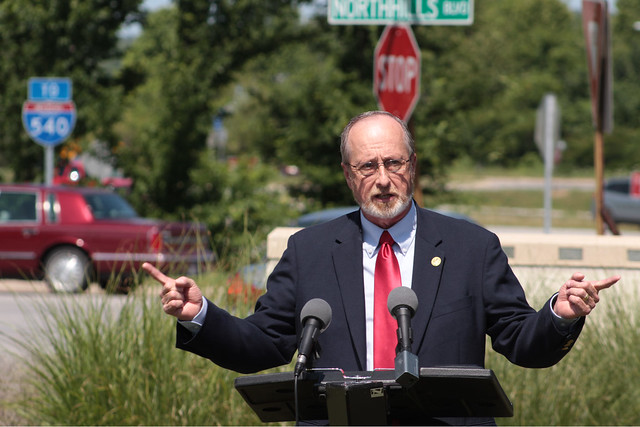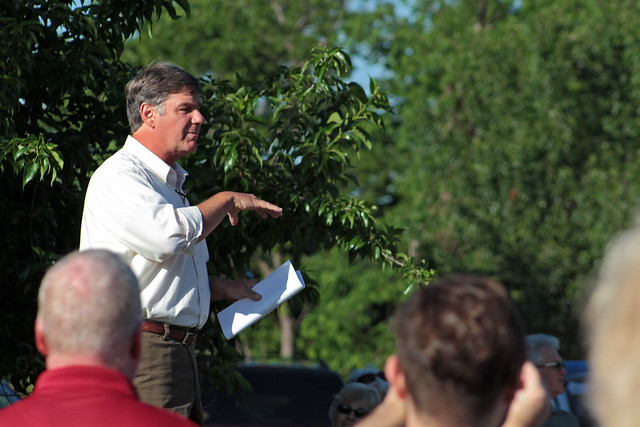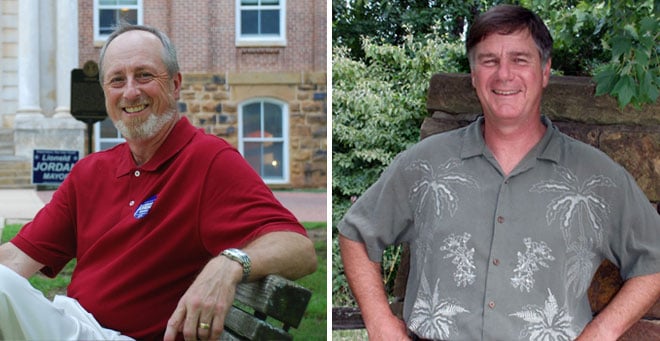
Fayetteville Mayor Lioneld Jordan (left) and former mayor Dan Coody are the only mayoral candidates in 2012.
With the Nov. 6 general election fast approaching, it’s time to take a closer look at the two candidates for Fayetteville mayor.
One one side, there’s the incumbent Mayor Lioneld Jordan who officially announced his plans to run for a second term in March. Jordan became mayor in 2008 after winning a runoff election against former two-term Fayetteville mayor Dan Coody.
Coody hinted on several occasions early this year that he was considering another run at the mayor’s seat. He officially kicked off his campaign in May.
There are two mayoral candidate forums scheduled for this week, but before the two duke it out in person, we thought we’d ask a few questions of our own.
Here are each candidates’ unedited answers:
1. In 2008, you each listed several of your favorite restaurants in town. Have there been any new additions to your list in the past four years?
Lioneld Jordan: I am a regular at Rick’s Iron Skillet on South School, and I would add such recent additions as Tanglewood Branch Tavern, Brick House Kitchen, and Union Kitchen in the new Chancellor Hotel.
Dan Coody: Fresco Café, Arsaga’s Trailside, Aquafire, Emelia’s and Mojo’s.
2. Name your top five places around town that best embody the unique spirit of Fayetteville.
Lioneld Jordan: It is difficult to limit to only five, but I would have to include Old Main, Wilson Park, the Farmers Market on the Square, Nightbird Books, and our wonderful Fayetteville Public Library.
Dan Coody: The Square/Farmers Market, the University campus, the Trail system and Botanical Gardens, Dickson St. (before pay-station parking). The Pavilion in Mt. Sequoyah Woods (I can count, but I can’t stop at just 5).
3. What is the biggest challenge Fayetteville faces as a result of the unprecedented growth in enrollment at the University of Arkansas?
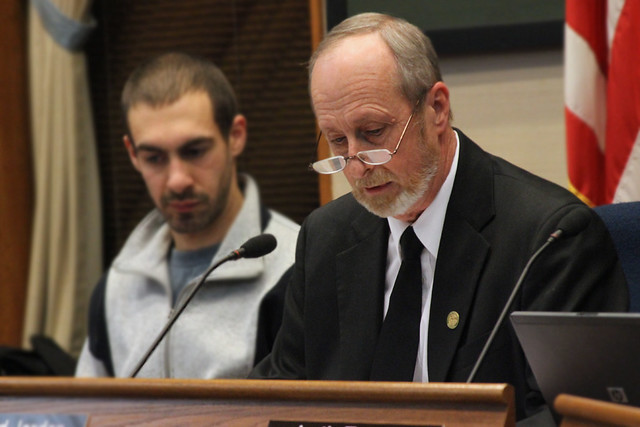
Mayor Jordan gives the annual State of the City address during a January 2011 City Council meeting.
Todd Gill
Lioneld Jordan: The challenges are virtually the same as with any population growth in our city. We must reach out to all new residents to make them feel welcome and offer opportunities to become involved in our community. I have held an annual Mayor’s Town Hall Meeting on campus to share information about City programs, services, recreational facilities, and volunteer opportunities, as well as to answer questions and address the concerns of students, faculty, and staff.
Another issue is providing adequate parking, since most students have cars. The University has three parking decks on campus, and the City is planning a new deck in the Downtown Entertainment District. We adopted the same kiosk system used in two of those decks on campus, except ours are solar powered and offer credit card, pay by phone, and text reminder options in addition to bills and coins.
The third issue is adequate and affordable housing for new faculty and students. The City does not construct homes and apartments for the general population, but we can assure that new construction complies with our city code and is compatible with surrounding neighborhoods and City Plan 2030.
We have an excellent partnership with Chancellor Gearhart and the University, and we recently established a Town and Gown Advisory Committee that includes local residents, city staff, and university staff and students to work together in planning for future growth and addressing these and other related issues in a proactive fashion.
Dan Coody: The City should have planned for the foreseeable explosion in student population after the lottery passed in 2009. Even though several enormous student housing projects are already approved, the City should work with the University to plan an overlay district for off-campus student housing that does not add more stress to our existing neighborhoods and traffic congestion. The City and the University should merge their master plans for a comprehensive growth plan that complements the campus and our community.
However, the biggest challenge Fayetteville faces is a lack of a clear vision, direction, and drive. There is a lack of understanding about how to seize existing creative and innovative opportunities to take Fayetteville to the next level in our quality of life. Expanding our art, music, film, and theater builds the foundation for an expanding technology/creative class economy for which Fayetteville is primed.
4. A cover story in a Little Rock publication last year claimed that Bentonville has “the kind of momentum that might threaten Fayetteville’s status as the queen city” of Northwest Arkansas. Do you agree with the author?
Lioneld Jordan: No. Northwest Arkansas is the fastest growing region of the state, and new opportunities for jobs, recreation, and entertainment benefit all area residents. Fayetteville’s leading role in establishment of the Razorback Greenway, a trail system that will stretch from Walker Park to Bella Vista is one example, the opening of Crystal Bridges Museum of American Art is another wonderful development for all area residents and their families, and we are in discussions concerning passenger rail service in the area. I don’t see this as any threat. The University’s continued growth expands the cultural and educational opportunities that have made Fayetteville unique for more than 140 years. Razorback Stadium and Bud Walton Arena have no plans to move anywhere. Where else can one walk from Nightbird Books to the Dickson Street Bookshop and find equal indulgence?
One indicator of Fayetteville’s prominence is that our hotel and restaurant sales exceeded the combined total sales for Springdale, Rogers, and Bentonville for the first six months of this year–even after the opening of Crystal Bridges and before the opening of our new Chancellor Hotel.
The Walton Arts Center is planning a multi-million dollar expansion of its Fayetteville facility, including additional theater and performance space. New events and festivals in the last four years are making our city even more vibrant – Artosphere, First Thursday, expansion of the Arkansas Music Pavilion, Fest-of-All celebrating our diversity, the annual Block Street Party, a Cheese Dip Festival, Fayetteville Roots Festival, Offshoot-Seedling Film Festival, the growth of craft breweries, opening of The Iceberg center for entrepreneurs and startup businesses, the successes of numerous green businesses from the University’s Genesis Business Incubator facility, and the new downtown home for studio artists at Fayetteville Underground. Fayetteville is the best place in Arkansas to live, work, and play, and it will continue to be the “Queen City” of Northwest Arkansas.
There is so much happening I can’t remember them all.
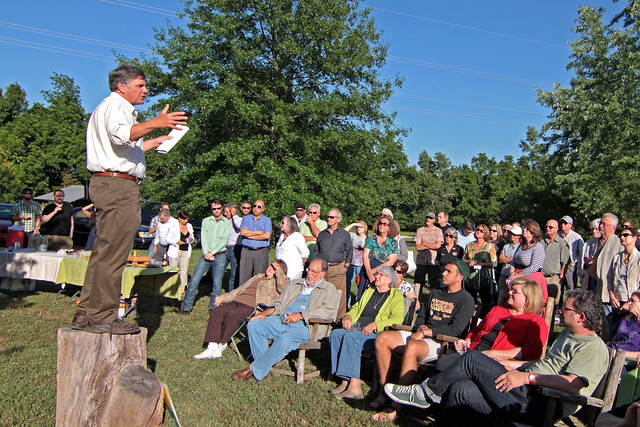
Dan Coody speaks to supporters during a campaign kickoff event near his Mount Sequoyah home in May.
Todd Gill
Dan Coody: Obviously, the author didn’t think that four years ago when Fayetteville was showing leadership nationally. What’s changed? We have been coasting on the legacy of my administration’s initiating the trails system, improving our infrastructure, beautifying our Square and College Ave., advancing sustainability, securing 700 acres of parks and greenspace (in the past four years less than 12 new acres have been added), cleaning up our watersheds, and building excellent amenities that we now take for granted. But we are quickly losing our momentum. Bentonville has a vision, a plan, and some serious drive. They are rapidly developing a first-class entertainment infrastructure based on art, livability, good restaurants, excellent parks, and beautification that no one can deny. When the growing community college becomes a four-year college, they will begin to get the feel of a young, hip, exciting town with an incredible future. Fayetteville has already begun losing small technology and business startups to Bentonville. While Bentonville recruits and nurtures new businesses, Fayetteville has developed the reputation of being less than welcoming. NWA, indeed, the country, once looked to Fayetteville as the leader in new ideas to copy. Now they look at our deeply unpopular parking program, back-in parking, going $10 million in debt to build a parking garage for a performing arts hall that is going to Bentonville, and they scratch their heads. Bentonville and Rogers tell all our unhappy business owners and our young, creative, innovators, “Y’all Come! This is where your future lies.”
If Fayetteville’s recent trend and Bentonville’s current trend continues, the author may be right. My plan is to build Fayetteville’s future on an entrepreneurial, innovative, and creative foundation that meshes perfectly with Fayetteville’s historically progressive vibe. We have to think regionally and recognize the synergy of the retail industry (Wal-Mart), logistics (J.B. Hunt), food production (Tyson), and research technology (U. of A.). We don’t need to compete with Bentonville. We need to chart an exciting course that is uniquely ours while becoming a full partner within our family of cities.
5. Are there any specific types of businesses that Fayetteville should be actively recruiting or working to attract?
Lioneld Jordan: Our community and economic development strategy has focused on Green Jobs that pay a living wage, specifically targeting the Knowledge Economy, the Experience Economy, Clean and High Tech Economy, the Creative Economy of Arts and Culture and the Medical and Healthcare Sector. The Fayetteville Forward plan was developed by hundreds of citizens who participated in the visioning process and continue to drive policy in Action Groups on the Creative Economy, the Green Economy, Local Foods, the Education Economy, the Health Economy, Inclusion, and others. We secured the Northwest Arkansas campus for the UA Medical Sciences, created the Green Jobs Training Centers of Excellence, secured the relocation of Delta Electronics (the first new manufacturing plant in decades), and added more than 1,060 new jobs in the last year, despite a continuing national recession. My staff and I will continue to work closely with the University of Arkansas Research and Technology Park to incubate innovative green businesses and offer support to secure their future success in our area. In addition to attracting new businesses, we have worked to assist with the expansion of existing industries and support our existing retail businesses with efforts ranging from new state funding through our improved relationship with Governor Beebe and the Arkansas Economic Development Commission to the “Find It In Fayetteville” campaign to developing a manual on How to Do Business in Fayetteville and streamlining the approval process to address the previous frustration and reputation for being “business unfriendly.” Business Week recently named Fayetteville among the Best Small Cities for Startups, and Forbes named us No. 4 in Best Places for Business and Careers for 2009.
Dan Coody: Absolutely! First, we need to repurpose the Tyson Mexican Original plant to become a home for the creative community. It is prime land with good access, services, and visibility. It is paid for and we have almost no money in it. When we fired it up for what became a “national model” for disaster relief after Hurricane Katrina, it was a 129,000 sq. ft. building on 10 acres ready for anything. Over the past four years it has been left to deteriorate instead of being recognized as the unique resource that it is. Sadly, it sat idle after the Joplin disaster.
When I was in office, I worked with Marlon Blackwell and the Community Design Center to create a concept for a facility that could house a wide range of activities, from art and theater, to small technology businesses. If you want to have your socks knocked off, go to coodyformayor.com web site and look at the design that was conceived. When I presented this concept to former Alderman Jordan and the rest of the Council there was too little support to pursue it. I think things may be different now. The concept was just ahead of its time.
6. With two years of paid parking on Dickson Street behind us, are there any changes that could or should be made to the program?
Lioneld Jordan: There was paid parking on Dickson Street for decades until the meters were removed for aesthetic reasons during the Dickson Street Improvement Project a few years ago, so the arguments against the concept are nothing new. We were encouraged by local businesses to seek more public parking, and both business owners and the Walton Arts Center expressed support for a parking deck as a solution. We held more than 16 public meetings before implementing the current system, met with local business owners, offered numerous opportunities to comment at Council meetings, and made many changes to accommodate the concerns of citizens. Most importantly, we added the residential parking plan to protect neighborhoods that had been requested by the Council in 2005 but never offered by the previous administration.
We chose the kiosk system for several reasons, including the aesthetic advantages over adding 400 parking meters, but also because it was the same familiar system used by the University of Arkansas for its Garland and Stadium Drive parking decks with numbered spaces and a payment kiosk. The differences are that City parking rates are lower than campus parking rates, have employee discount rates, use solar powered kiosks, and offer credit card and pay by phone options to provide more convenience in addition to coins and bills. I brought the plan to the City Council, which unanimously approved the initial program and the suggested changes.
One source of complaint has been that the privately owned lot owners tow vehicles or place boots on cars, something that does not happen to customers in city-owned lots, so we have posted signs informing patrons. We are currently in discussions with private lot owners about the possibility of managing those lots, so that is one possible change in the future.
In 2005, the Coody administration recommended that paid parking hours in the Dickson Street area be enforced for 17 hours from 7:00 a.m. until midnight. The current plan is for 12 hours from 2:00 p.m. until 2:00 a.m.
My opponent also has been saying the current $15 fine for overtime parking is too high; however, Mr. Coody and his Director of Operations, Gary Dumas, previously proposed in 2008 that the overtime parking fines be $40 in the Dickson Street area.
Mr. Coody has also made public complaint that enforcement for violations was too aggressive; however, the facts tell a different story. For example, in 2007 with only paid parking in the Downtown area, the City issued 16,912 citations and voided 823 tickets. Within the last twelve month period, for both the Downtown area and the addition of 431 paid parking spaces in the Dickson Street Entertainment District, we issued 18,801 citations and voided 2,839 tickets. So, even with doubling the number of spaces, the net citations issued were 16,089 in 2007 and in the last 12 months it was only 15,962 net citations.
Dan Coody: The answer “yes“ is an understatement. We need to negotiate a management agreement with all the private lots that will end the towing and booting. This is hurting our reputation and businesses in the District. I realize City Hall thinks everything is fine because HMR revenues are climbing, but that situation has to change.
We need to simplify the program with one enforcement time for the Downtown and Entertainment district. My administration enforced parking for 50 hours a week and tickets were $5. Mayor Jordan’s program enforces parking 126 hours per week and increased ticket prices to $15. ($70 for residential). My plan is to go back to a reasonable standard of enforcement, say, 8-5, Monday through Friday. Free after 5 and on weekends.
The Jordan Administration spent almost $900,000 on this new system. Instead of scrapping it and wasting all that money, my plan is to have the best of both worlds. We could add relatively inexpensive meters, like those around the Square, for plugging nickels, dimes, and quarters (they are made in Russellville, AR.). If someone wanted to use a credit card, cell phone, or folding money, they could use the kiosks. Fayetteville already uses the technology to make this hybrid system work.
Point of interest: According to the City’s police website, between 9/16 and 9/23 (that’s 8 days), 329 new warrants were issued. Of those, 277 or 84% were for parking violations. Welcome to Fayetteville!
7. Do we need a parking deck near Dickson Street? Why or why not?
Lioneld Jordan: Of course we do. The Walton Arts Center study in February 2012 identified the need for a parking deck as a priority, and we must provide parking for visitors who drive to enjoy other locations and events in our Downtown Entertainment District if we are to continue its expansion. With the looming loss of 170 private parking lot spaces to the construction of the new apartment complex between Lafayette and Watson, such a facility is even more necessary.
The previous administration first proposed in 2005 to build a $19 million, 640-space deck on the University Baptist Church lot, but they were unable to finalize that plan. In 2007, the Coody administration proposed a public/private partnership to build a 200,000 square foot structure including a parking deck with a minimum of 500 spaces adjacent to the Walton Arts Center, but there were legal questions about that plan, and no final proposal was ever submitted to the City Council for approval.
We now have a plan that will work, a proven revenue stream from those who choose to use it, and a Mayor and Council that worked closely together to enact a feasible plan that is both affordable and constitutional.
My opponent also has been making claims that the proposed 350-space deck is not compatible and is too large and unsightly; however, the Council has not yet approved the specific site and no architects have been retained to design the deck, so such politically-motivated complaints are totally unfounded. There will be numerous public sessions for citizen comment before approval of a final design by the City Council.
Dan Coody: Not the way we are going about it now. During my second term, we studied a comprehensive parking, commercial space, and deck project. Three companies proposed to build new commercial/retail/live-work space, a museum or performing arts hall, with all the requisite parking, plus 500 more public spaces all at their expense. It was designed to reflect the Downtown Master Plan. The numbers didn’t work without a paid parking system and the Council said they “did not want to be in the paid parking business.” That was then.
Concerning the current project, there is very little open public discussion of whether to build it, how to build it, where to build it, what it should look like. There is no discussion about how it should be paid for, if there are other options to increase parking, or if locking in this current parking program for 25 years to repay the debt is the best approach. Almost all the “public meetings” were held during working hours, and even that limited input has been discarded. There has been no “designing in public” for what we are gong to get, much like Block Ave. and the unpopular parking program. All that is needed to commit $10 million to this less-than-transparent project is the mayor’s signature. Fortunately, the mayor has stated he will wait until after the election to sign the papers. Here is the approach I will take if I am elected:
- Put this $10 million debt on ice.
- With serious public input, implement a simple, convenient, uniform, customer/employee/business-friendly paid parking system.
- Re-adopt the progressive, citizen-driven Downtown Master Plan to make downtown safe, well lit, attractive, and walkable.
- Collaborate with Dickson/Downtown businesses to fund simple, fun, hop-on-and-off small electric shuttles on busy nights and establish convenient routes to access the many existing, underutilized downtown lots and decks that are already built and paid for.
- Negotiate with private parking lot owners to create a more uniform and fair downtown parking system.
Concurrently, we need to look ahead to bring new life, diversity, business opportunity, and beauty to our city center. If I win the election, I will:
- Bring together everyone who is interested to help design and plan for a “remodel” of the sea of asphalt around the Walton Arts Center. It should include new commercial/retail/live-work space, some greenspace or small park that could house public art, and civic event space.
- Get it done.
Those who say, “We can’t do it. We can’t afford it.” do not know how to create and leverage the incredible opportunities and assets we have. If we accept a “we can’t afford to invest in our future” mindset, combined with a lack of understanding for what is possible, Fayetteville will continue to stagnate and miss unique opportunities to fulfill our potential. The author referenced in question #4 will be very correct.
8. What do you think is the single most important piece of legislation you were involved with during your time as mayor of Fayetteville?
Lioneld Jordan: There were many important ordinances passed during the last four years, from low impact development to residential energy standards to streamside protection, all of which we were the first in Arkansas to enact; however, nothing was more important than restoring our city to a sound financial position and passing the city’s first balanced budget in more than a decade. We must be realistic and be responsible stewards of the taxpayers’ money, and that is my record.
Dan Coody: Initiating the Fayetteville Trails system. Adopting a citizen-driven 129 mile trails plan, pushing for the funding and the in-house teams to design and build them, and getting the Council to fund it was not easy, but we got it done. Now the Trail system has developed a life of its own. I’m still a huge proponent for the city master plans and sustainability program, but I think that the trails have had the most significant impact on how we feel about our city. It attracts the creative, innovative people that will help us add depth to our quality of life and our economy. I believe that the overwhelmingly positive reaction to our trails system paved the way, so to speak, for the Razorback Greenway. When it’s finished, it will have an amazing effect on how we view our region. If I am elected, I plan to accelerate the east/west corridors of our plan to connect up with more neighborhoods, schools, and business centers.
9. There must be something you wish you’d handled differently while in office. Let’s hear about it.
Lioneld Jordan: I wish I could have taken more time to be with my family – my wonderful wife, my four adult children, and my five grandchildren. I come to the office before 7:00 and often leave after 5:00 to attend other community events, and most of my weekends are spent supporting local organizations that make this a great community. I love this city, and I love this job, but I miss the chance to go camping with my family, spend a quiet weekend at home with my wife, or read a book to my grandkids.
Dan Coody: I always think about how I could have done things better. I asked the Council to consider hiring an engineering firm to oversee the enormous Waste Water Treatment System Project. The Council agreed and, after interviews, hired a firm. Later, after much complication, we agreed to let the company go and bring project management in-house. In retrospect, I should have pulled together our City staff team of Jurgens, Hyke, and Bell at the very beginning to oversee the project. That would have saved us a lot of time and headache. The construction bids came in higher than early estimates predicted but once construction started it was executed smoothly (it came in $7 million under bid) and the system has worked perfectly from the start. We have stopped raw sewerage overflows into our drinking water supply and improved both the White and Illinois River water quality. This investment in a much cleaner environment will last for decades.
10. We saved the hardest one for last. Say something nice about your opponent.
Lioneld Jordan: My opponent hired John Coleman as the City’s first Sustainability Director, and John did an excellent job.
Dan Coody: Lioneld is devoted to his family and he cares about the City. He works as hard as he can to do what he thinks is right. He and I may have different perspectives on what to do, how to do it, and why, but that’s life. He’s a decent guy.
